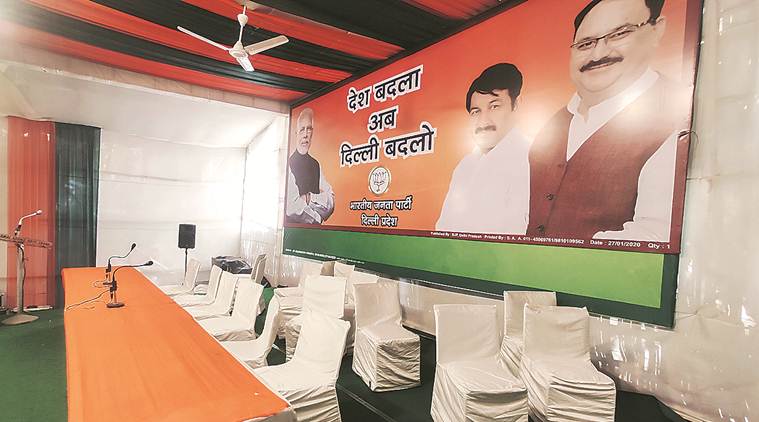 The BJP office in New Delhi on Tuesday. (Express photo by Abhinav Saha)
The BJP office in New Delhi on Tuesday. (Express photo by Abhinav Saha)
While BJP leaders put up a mask of confidence ahead of Tuesday’s counting of votes for Delhi Assembly elections, top leaders who took part in the campaign admitted that there was a realisation long before the polling day of February 8 that the state unit was in a shambles, that the local leadership had no connect with voters, and that the national issues they were harping were not enough to defeat the Arvind Kejriwal-led AAP.
The canvassing that burst to life in January — led by Home Minister Amit Shah and involving a battery of party MPs, Union ministers and office-bearers of different affiliated organisations — was too little and too late, some of the leaders who took part in the campaign told The Indian Express. It emerged from conversations with several leaders who took part in campaigning that the BJP national leadership was told that the issues the party was highlighting had traction, but might not translate into votes.
“At one slum cluster, a young girl in voting age stood up and said that everyone there had benefited from the AAP government’s decision to waive power charges,” said a BJP MP, adding that the Shaheen Bagh pitch did not cut much ice. “Our focus on, say, health insurance of Rs 5 lakh under Aayushman Bharat, which has not been allowed by the Kejriwal government, did not register, as they cited tangible benefits of power and water bill waivers.”
At least three senior leaders who were part of the campaign process said the “uninspiring” state unit leadership hurt the party’s prospects most. “I did not feel the local leadership, including the state unit chief (Lok Sabha MP from Northeast Delhi Manoj Tiwari), had any connect with voters. The party could not effectively use its old leaders, who have deep understanding of the voters’ psyche,” said one party leader who came from West Bengal.
According to this leader, BJP’s traditional supporters, including traders, remained “spectators” because there was “no effort from the party to pull them in” the campaign.
The leader also pointed out that BJP did not have any personality whom Delhi’s young voters could identify with. A party worker explained, “While AAP had young and educated leaders such as Atishi and Raghav Chadda, who spoke on education and development, our young leaders came into news for hate speeches. Many youths pointed it out to us.”
An office-bearer of one of the morchas said: “People from the lower strata of the society expressed their affection and respect for Prime Minister Narendra Modi, but when we started talking about Delhi, they said they were quite happy with the state government. We could sense that they were not in a mood to vote for us.”
But for those from the upper strata, this office-bearer said, Kejriwal was “not an elite (person), and many of them seem to have voted for BJP”.
A Union Minister who was involved in campaigning said, “While we were doing door-to-door campaigning, there were people who would clutch our hands and say, let it be for Kejriwal in this election; this is not for Modi.”
This minister said that many people agreed that the protest against CAA and NRC at Shaheen Bagh was “anti-India”, but they did not see the protesters as a threat. “They were confident that the Union government would remove them after the election. Somehow, many voters seemed to have seen a political angle to the whole campaign (by BJP) over Shaheen Bagh.”
The party MPs, however, remain divided on the decision to make Shaheen Bagh protests a key issue. “How could we not have done it? It resonated with our ideological position against appeasement of a particular community,” said one minister. But a BJP MP said, who also took part in the campaigning, said, “That issue was needless and in bad taste. The reckless remarks by Parvesh Verma and Anurag Thakur were also taken in bad taste.”
Another MP differed: “But for Shaheen Bagh, the BJP would not have got (even) eight seats”.